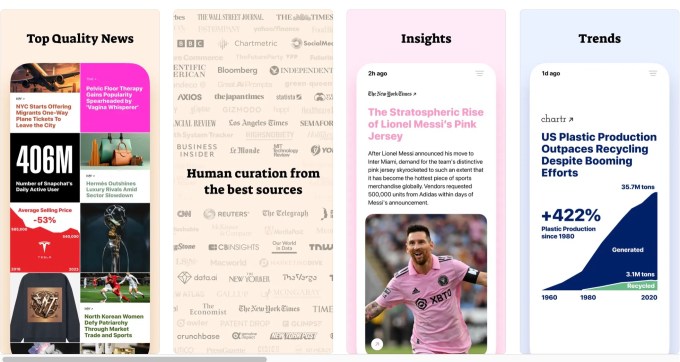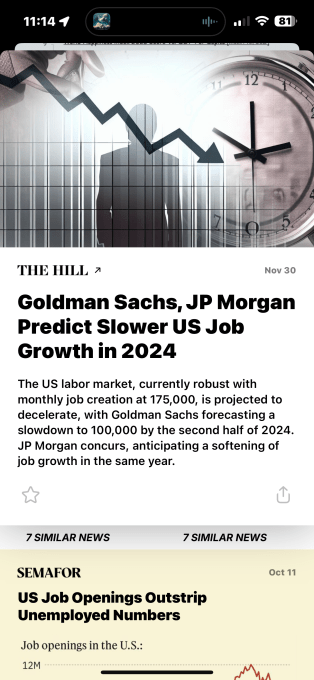Capsule’s new app combines AI and human editors to curate the news
A Paris-based startup called Capsule wants to transform the way users seek out their daily news. Instead of offering a standard news aggregator experience, Capsule’s mission is to become the “Spotify for news” by combining AI technology and human editorial curation to provide a news-reading experience that transforms news articles, newsletter snippets and even tweets (posts on X) and other social updates, into digestible information through its user-friendly app.
The experience of using Capsule, meanwhile, feels much like swiping through TikTok or other social apps in some ways. The app employs a vertical scrolling feed where news is presented as a series of headlines with accompanying photos, or screenshots of posts on platforms like X and LinkedIn. You can tap on any of these headlines to read a summary of the news, then optionally tap the link to the news source in the upper-left corner to read the full article (or social post) directly on the publisher’s website.
The idea for the app comes from co-founders Jérôme Boé and Arthur de Villemandy. Boé had previously developed a clever short-form video app called Snax, which he later had to shut down due to the operational costs outweighing the returns, he says. Co-founder de Villemandy, meanwhile, had previously authored a newsletter called “Magma” which focused on business trends and insights.

Image Credits: Capsule
Boé explains the inspiration for their new company was to find a way to make quality news more accessible by leaning on a network of curators. Later, the company plans to organize the world of news and information the way Spotify organizes music by creating “playlists” of news and adding recommendations.
“Capsule isn’t trying to be another Google News-style aggregator,” Boé tells TechCrunch. “It’s more than just clicking through to a source. Think of it as a starting point where we dive deeper. We research, cross-reference, and inject extra data to give users a fuller picture. It’s like a mini newsletter, packed with clickable links, images and interactive elements are on the horizon,” he says.
The company leverages AI to distill the essential information or the main insights from an article. Then, Capsule’s editorial team adds to these insights with additional research. Currently, Capsule employs a team of 10 freelancers from around the globe for this effort. These curators are described by the company as “avid readers with a unique perspective.” They also are tasked with seeding the app with new content, an area where Boé says “AI doesn’t cut it.”

Image Credits: Capsule
“It needs a nuanced, subjective approach to see if something fits our editorial ethos which is all about trends and insights for modern leaders,” he explains. “We focus solely on the quality and relevance of the content, deliberately avoiding other metrics such as social shares or likes.”
The curators’ news findings are also sourced and verified by Capsule’s editorial team, who then present the news in the app in a digestible format. Every day, there are around 20 to 30 selected insights added to Capsule, that highlight things like major news, strong trends and even weaker signals.
AI is also used to help curate related news stories. Beneath articles in Capsule, users will find a selection of similar news. This helps to enhance the “depth and breadth” of their reading experience, says Boé.
Unlike other modern news-sharing apps, like Artifact, Capsule has no current limitations on the sources for the news that may show up in its feed. So far, the app has already tapped into over 400 news sources and counting, the company notes.
For now, the four-person team at Capsule is bootstrapping the startup but is considering a freemium model in the future if Capsule is able to perfect the user experience and find traction, Boé says.
The app is currently a free download on iOS.


